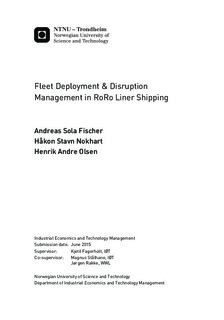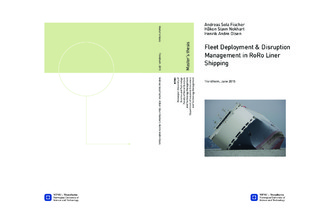| dc.description.abstract | This master thesis consists of two parts. In Part I, the maritime fleet deployment problem for a major Roll-on Roll-off shipping case company is studied. The objective of the fleet deployment problem is to assign vessels in the company s fleet to voyages that must be sailed within given time windows and to cover monthly demand. In this thesis we introduce an approach where demand is modeled as actual cargoes, and different speeds can be assigned to both voyage and ballast sailings. In addition to a mixed-integer program, two heuristics are developed; an adaptive large neighbourhood search and a rolling horizon heuristic. These may help find satisfactory solutions within an appropriate amount of time.
The models are applied to realistic problem instances varying both in size and complexity. Results show that the mixed-integer programming model is not able to solve the largest and most complex instances within a time frame of 10,000 seconds. The rolling horizon heuristic performed excellent for most of the instances both in terms of solution time and quality, and can be used as a decision support tool for the case company when planning the fleet deployment.
In Part II, we study disruption management in Roll-on Roll-off liner shipping. We in- troduce uncertainty to the fleet deployment problem by adding disruptive events in a simulation framework. First, we identify possible events and their associated impacts. Then we propose several robustness strategies which may be used in planning. These are considered as proactive ways of handling disruptions.
The basic model and the robustness strategies are in a computational study evaluated in a simulation-optimization framework, where a re-planning recovery procedure serves as real-time disruption management. The presented results show that by adding robustness to deployment plans, the incurred operating costs and delays are significantly lower. The re-planning procedure further reduces delays and costs, although by performing many alterations to the plans during operation. | |

